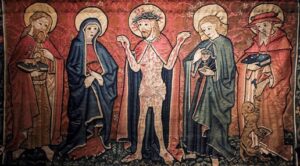Vulnerability

But he was wounded for our transgressions,
he was bruised for our iniquities:
the chastisement of our peace was upon him;
and with his stripes we are healedIsaiah 53:5
An aspect of our victim haunted world is the prevalence of concern for the ‘most vulnerable’ among us. To be vulnerable, etymologically speaking, is to be able to be wounded. These days our sensibilities have become so highly refined that we are aware of every wound to our bodies, our feelings, even our psyches. So much so that not even an actual wound is required for a claim to victim status, only the threat of the possibility of a wound can be the occasion of micro aggression against an alleged victim; a virtual victim.
In the social controversy surrounding abortion in America we hear claims of victimhood by those whose freedom to choose to end the life of a child in the womb is limited.
According to Isaiah, the Suffering Servant was wounded for our transgressions; transgressions of God’s law – sin. In Genesis we are told God created humankind with free will which Adam and Eve used to transgress the only prohibition God asked them to abide by. St. Augustine later understood this as the original sin of our first parents the effects of which are passed down to every subsequent member of the human race, except for Our Lady who was by grace born without stain of original sin, whose womb was the first home of Him who would come into the world to be wounded for our transgressions. Yet, she too would be wounded, as foretold by Simeon: “Yea, a sword shall pierce through thy own soul also, that the thoughts of many hearts may be revealed.” (Lk 2:33).

Human freedom and the wounds resulting from it have left us wary and wanting to be freed from the fear that our freedom has engendered. We are caught in the web of the mystery of iniquity.
We live in a wounded world, environmentally, socially, politically, emotionally, grieving for the harms done to us or victims we identify with. We have been from as far back as we can remember turning our griefs into grievances by which we repeat the cyclical search for those responsible for our sorrows and suffering, and upon whom we call down a just recompense.
In his discussion of “Rhenish-Flemish Mysticism,” Hans Urs von Balthasar refers to a passage in the writings of Heinrich Suso:
In a great prayer Suso praises God in “the pains of all wounds, the groans of all the sick, the sighing of all who mourn, the tears of all who weep, the insults borne by all the oppressed;” this is possible because God the Son is “the sole Sufferer”: thus all who suffer should form a circle around him, thirstily drinking from him who is the “overflowing wellspring of grace.” [Theo-Drama, Vol. V, p. 456.]
A few pages earlier, von Balthasar quoted another of the Rhineland mystics, the 14th century Johannes Tauler, who wrote: “we do not follow God by experiencing a sense of well-being but by taking up our Cross.”



We have been from as far back as we can remember turning our griefs into grievances by which we repeat the cyclical search for those responsible for our sorrows and suffering, and upon whom we call down a just recompense.
Exactly. And when is the “just recompense’ not really vengeance?